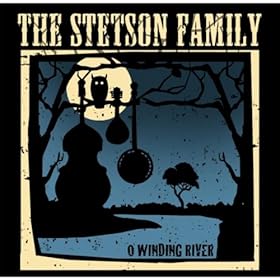|
Audrey Auld, Tonk (Reckless, 2013) The Stetson Family, Winding River (independent, 2013) I suppose the time for surprise at this should be long past. Still, I am taken aback whenever I find myself within hearing distance of non-Americans, even English-speaking ones, who choose to perform quite specifically American musical genres. While rock was invented here and could have been invented nowhere else, by now it's a thoroughly internationalized form of popular art. At the same time some kinds of music seem so tied to specific American regions and modes of expression that, while one can understand more or less why they might appeal elsewhere, one still wonders why anybody without closer ties to the musics' origins would want actually to do it.
Auld herself doesn't sound like anybody in particular, though there's no question she's conversant in Western swing, honkytonk, gospel, the Carter Family and Loretta Lynn. Lynn couldn't have written "Your Wife," whose sexual sensibility is definitely of the 21st century, but the song wouldn't have existed without her. The gospel "Bound for Glory," which exudes the Carterish, borrows the title of Woody Guthrie's semi-autobiographical novel. Guthrie himself shamelessly filched Carter melodies, and A.P. Carter just as brazenly stole them from folk songs, hymns and parlor ballads. So Auld burrows herself deeply into a grand American tradition of musical thievery, and who's to object? Tonk doesn't feel entirely American, though. That's because most of those seeking to make it in today's Nashville don't know or care about musical history, just about what's on the charts at the moment. And what's on the charts at the moment is rarely anything worth knowing in any other than a market sense. Auld cares about real country music like they used to, and she sings her idea, and a good one, of it. I don't know what that will do to enhance her career, inasmuch as her approach is too intelligent, too distinctive and too self-aware to pass for what passes for country these days. Still, she's done a favor to those of us who live for actual, as opposed to manufactured, music.
I can only surmise what their musical backgrounds are. I would guess that the group is the melding of pickers from separate folk and country scenes. I claim no more than modest authority on Australian roots music, but I am conversant in some of the 19th-century bush ballads and am acquainted with works of Banjo Paterson (who wrote "Waltzing Matilda" and "The Man from Snowy River") and Slim Dusty (a longtime Australian singer whose persona was a cross between Woody Guthrie and Hank Snow). I hear both Paterson and Dusty in the Stetsons's songs. How consciously the Stetsons put them there, I can't say; yet the Stetsons certainly give the impression of being an Australian folk string band that has absorbed elements of American bluegrass and country. The landscape evoked in the band's songs, all originals, strikes me as more Outback than Appalachia, even if the geographical references are unspecific, perhaps deliberately so. What's happening here, I think, is a nearly sui generis fusion that, if sometimes a bit disorienting, is always striking and sometimes, as in the title song and elsewhere, downright gripping. 

|
 Rambles.NET music review by Jerome Clark 9 November 2013 Agree? Disagree? Send us your opinions! 



 |


